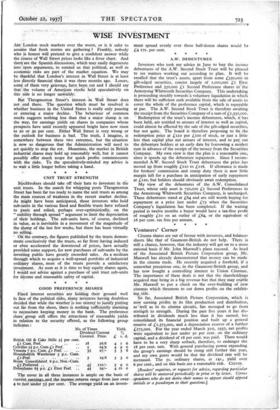Venturers' Corner
Cinema shares are out of favour with investors, and balance- sheets like that of Gaumont-British do not help. There is still a chance, however, that the industry will get on to a more rational basis if Mr. John Maxwell's plans succeed. As head of the Associated British Picture Corporation group, Mr. Maxwell has already demonstrated that money can be made in the cinema trade. He recently acquired a foothold, if a somewhat precarious one, in the Gaumont-British group, and has now bought a controlling interest in Union Cinemas. The importance of these deals is not that the shareholdings acquired may bring in a big revenue but that they may enable Mr. Maxwell to put a check on the over-building of new cinemas which threatens to cut down profits on the exhibit- ing, side.
So far, Associated British Picture Corporation, which is now earning profits in its film production and distribution, as 'Well as in its cinema circuits, his managed to go from strength to strength. During the past five years it has dis- tributed in dividends much less than it has earned, has consolidated its financial position and built up a general reserve of £1,375,000, and a depreciation reserve of a further £275,000. For the year ended March 31st, 1937, net profits were equivalent to just under so per cent. on the ordinary capital, and a dividend of 18 per cent. was paid. There would have to be a very sharp setback, therefore, to endanger the 18 per cent. rate. With general purchasing power expanding the group's earnings should be rising still further this year, and my own guess would be that the dividend rate will be increased. The 5s. ordinary shares, at 14s., yield over 6 per cent., and on this basis are a reasonable risk. CUSTOS.
[Readers' enquiries, or requests for advice, regarding particular shares will be answered periodically in print or by letter. Corre- ..spondents who do_ not desire their names to appear should append initials or a pseudonym to their questions.]






























































 Previous page
Previous page